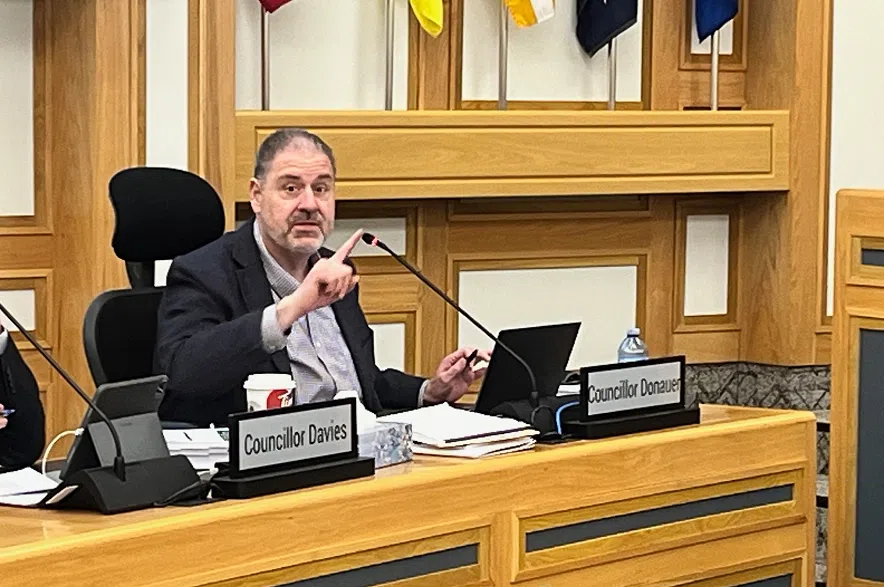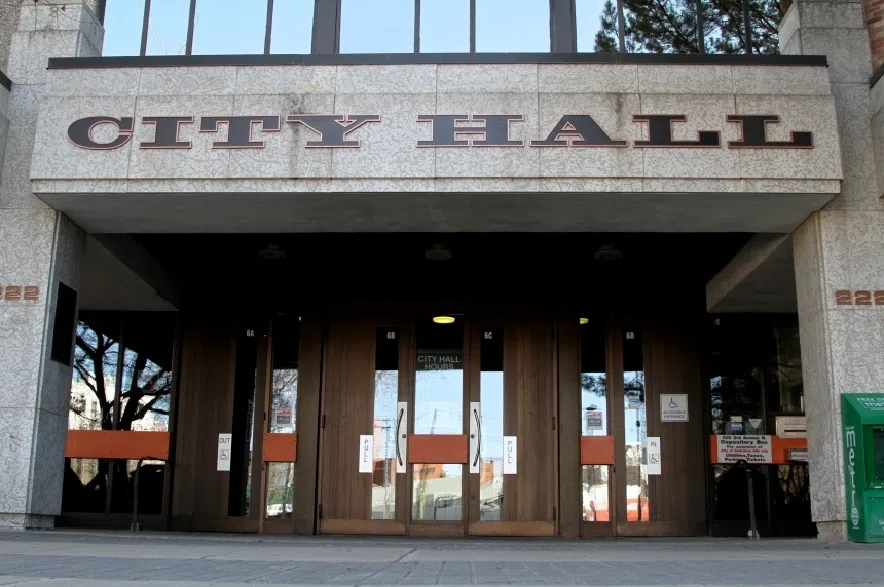There was a swift and strong reaction from several Saskatoon city councillors after a motion recommended increasing taxes for businesses.
The motion, put forward by Coun. Mairin Loewen during the second day of budget deliberations in Saskatoon, suggested that the city’s property tax ratio be altered in favour of home and property owners.
Councillors are currently trying to whittle down a two-year, $40-million budget shortfall this week in order to avoid potentially massive property tax increases.
According to city manager Jeff Jorgensen, Saskatoon businesses carry 33 per cent of the city’s property tax load, while residents carry 67 per cent. In comparison, he said businesses in Calgary carry 48 per cent of the tax load, while residents make up the remaining 52 per cent.
The first of three motions put forward by Loewen suggested that Saskatoon businesses take on much greater portion of taxes – amounting to a 4.23 per cent increase – while residents’ tax share would be lowered by 2.01 per cent.
“I do think it’s worth entertaining this motion,” said Loewen.
Several of her colleagues immediately responded with opposition.
“The part that makes me the most nervous about this is we are catching everybody off guard,” said Coun. Randy Donauer. “Nobody is on the speaker’s list for this. Nobody.”

Ward 5’s Randy Donauer was not happy with a motion that would have raised business taxes in Saskatoon. (Lara Fominoff/650 CKOM)
Coun. Troy Davies also voiced strong opposition to the motion, saying that council would be asking businesses to absorb a significant tax increase with no planning or warning.
“This right here would shut the doors,” he said, speaking from his own experience as a small-business owner.
Coun. Hilary Gough, on the other hand, supported the motion.
“Residents pay more, and what I’m hearing very clearly from residents is they can’t afford to, and they’re looking for us to make sure we have scrutinized all of the tools that we’re using,” Gough said.
Coun. Darren Hill questioned whether the motion was out of order. Loewen shot back, saying the motion was allowed.
“To hear colleagues cast aspersions on my intent, and on the legitimacy of the process, is offensive to me,” Loewen said.
Jason Aebig, CEO of the Greater Saskatoon Chamber of Commerce, also responded sharply to the motion in a social media post.
“Divide and distract–the worst kind of politics and below otherwise good leaders like Councillors Loewen and Gough,” Aebig wrote.
“Thankfully, the rest of council intervened on today’s attempted ambush on (Saskatoon) biz owners/employers and protected thousands of jobs and incomes across the City.”
Divide and distract—the worst kind of politics and below otherwise good leaders like Councillors Loewen and Gough. Thankfully, the rest of Council intervened on today’s attempted ambush on #yxe biz owners/employers and protected thousands of jobs and incomes across the City. pic.twitter.com/TdIKBjkIut
— Jason Aebig (@JasonAebig) November 29, 2023
The first motion was defeated nine to two.
Aebig called on members of the chamber to “take note of the Councillors who saved jobs and livelihoods today.”
Loewen’s other motions called for administration to report back to council regarding “the potential to create a small business taxation sub-class and potential tools to mitigate impacts on small businesses.”
A third, joint motion with Coun. Cynthia Block called for administration to report back on business tax ratios and their impact on economic indicators, including data from our city and a jurisdictional analysis.
Both passed unanimously.
Council closes funding gap by $1.68 million
The first of city council’s cuts didn’t come until Wednesday afternoon, when a motion from Donauer for a three-per-cent reduction in contributions to all capital reserves impacting the mill rate, except for fire and roadways preservation, narrowly passed by a 6-5 vote.
Other cuts included $200,000 to reduce billboard locations and land maintenance expenditures. Investment in new street lighting saved $150,000, and $25,000 was saved by eliminating future Christmas tree drop offs.
According to Clae Hack, the city’s chief financial officer, the total cuts came to about $1.68 million.
“That would bring, if left unmitigated over the next few days, a property tax increase of 6.65 per cent in 2024 and 5.61 per cent in 2025,” he said.
Hack said he was “pretty confident” the funding gap would be further closed over the remaining budget meetings, although he did admit that the gap was still quite large.
“Right now, where we’re sitting, it’s certainly larger than we’ve seen in the past. So that’s what we’re here for over the next couple of days is to continue working on it and get it down as low as possible,” he added.
Hack also emphasized that it is fairly common for cities to be left with a funding gap at the end of budget deliberations, which is why property taxes increase each year.
At the end of Wednesday’s meeting, council voted to continue budget deliberations until 9 p.m. Thursday evening if there was certainty that council would complete its task in that time.
If not, a fourth day of budget deliberations could be scheduled for Friday morning.







